



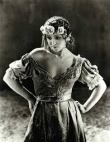
1 August
 The Unknown (Dir. Tod Browning, US, 1927) (Screening format – 35mm, 69 mins) To escape the police, Alonzo, who has two thumbs on one hand, poses in a sideshow as an armless wonder. He falls in love with Estrellita, and when detected by her father, he kills him. Then, discovering that the girl abhors the touch of a man’s hand, he has both his arms amputated. Returning, he finds to his dismay that she has fallen in love with Malabar, the strong-man. Is all lost for Alonzo….The Unknown was the sixth of ten collaborations between Chaney and director Tod Browning. Its circus theme was a favorite of Browning’s, both on and off screen. Chaney was already “The Man of a Thousand Faces” when he appeared in The Unknown but in this film Chaney didn’t need to rely on heavy make-up to transform himself for a role. For The Unknown, Chaney reported, “I contrived to make myself look like an armless man, not simply to shock and horrify you but merely to bring to the screen a dramatic story of an armless man.” Find out more at moviessilently.com . With live piano accompaniment. BFI Southbank, London Link
The Unknown (Dir. Tod Browning, US, 1927) (Screening format – 35mm, 69 mins) To escape the police, Alonzo, who has two thumbs on one hand, poses in a sideshow as an armless wonder. He falls in love with Estrellita, and when detected by her father, he kills him. Then, discovering that the girl abhors the touch of a man’s hand, he has both his arms amputated. Returning, he finds to his dismay that she has fallen in love with Malabar, the strong-man. Is all lost for Alonzo….The Unknown was the sixth of ten collaborations between Chaney and director Tod Browning. Its circus theme was a favorite of Browning’s, both on and off screen. Chaney was already “The Man of a Thousand Faces” when he appeared in The Unknown but in this film Chaney didn’t need to rely on heavy make-up to transform himself for a role. For The Unknown, Chaney reported, “I contrived to make myself look like an armless man, not simply to shock and horrify you but merely to bring to the screen a dramatic story of an armless man.” Find out more at moviessilently.com . With live piano accompaniment. BFI Southbank, London Link
5 August
 Pandora’s Box (Dir. G W Pabst, Ger, 1929) (Screening format – not known, 135mins) Based on two plays by the German author Frank Wedekind, Erdgeist (Earth Spirit, 1895), which Pabst himself had directed for the stage, and Die Büchse der Pandora (Pandora’s Box, 1904), the silent drama follows the tumultuous life of the showgirl Lulu whose unselfconscious sexuality brings about the ruin of all those that fall for her and eventually her own. In a daring move,
Pandora’s Box (Dir. G W Pabst, Ger, 1929) (Screening format – not known, 135mins) Based on two plays by the German author Frank Wedekind, Erdgeist (Earth Spirit, 1895), which Pabst himself had directed for the stage, and Die Büchse der Pandora (Pandora’s Box, 1904), the silent drama follows the tumultuous life of the showgirl Lulu whose unselfconscious sexuality brings about the ruin of all those that fall for her and eventually her own. In a daring move, 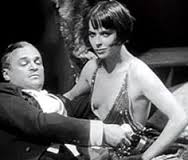 Pabst chose a little known American actress over the more experienced Marlene Dietrich for the part of Lulu, a decision that made the young Louise Brooks an international star. Her innocent looks paired with her natural erotic allure and sense of movement – Brooks was also a dancer – perfectly matched Pabst’s idea of his heroine as unwitting seductress. Subjected to cuts to eliminate some of its “scandalous” content and unfavourably reviewed by critics at the time, it is now considered one of the boldest and most modern films of the Weimar era highlighting Pabst’s command of camera language and montage. Find out more at silentlondon.co.uk . With recorded soundtrack. Regent Street Cinema, London Link
Pabst chose a little known American actress over the more experienced Marlene Dietrich for the part of Lulu, a decision that made the young Louise Brooks an international star. Her innocent looks paired with her natural erotic allure and sense of movement – Brooks was also a dancer – perfectly matched Pabst’s idea of his heroine as unwitting seductress. Subjected to cuts to eliminate some of its “scandalous” content and unfavourably reviewed by critics at the time, it is now considered one of the boldest and most modern films of the Weimar era highlighting Pabst’s command of camera language and montage. Find out more at silentlondon.co.uk . With recorded soundtrack. Regent Street Cinema, London Link
6 August
 The Unknown (Dir. Tod Browning, US, 1927) (Screening format – 35mm, 69 mins) To escape the police, Alonzo, who has two thumbs on one hand, poses in a sideshow as an armless wonder. He falls in love with Estrellita, and when detected by her father, he kills him. Then, discovering that the girl abhors the touch of a man’s hand, he has both his arms amputated. Returning, he finds to his dismay that she has fallen in love with Malabar, the strong-man. Is all lost for Alonzo….The Unknown was the sixth of ten collaborations between Chaney and director Tod Browning. Its circus theme was a favorite of Browning’s, both on and off screen. Chaney was already “The Man of a Thousand Faces” when he appeared in The Unknown but in this film Chaney didn’t need to rely on heavy make-up to transform himself for a role. For The Unknown, Chaney reported, “I contrived to make myself look like an armless man, not simply to shock and horrify you but merely to bring to the screen a dramatic story of an armless man.” Find out more at moviessilently.com . With live piano accompaniment. BFI Southbank, London Link
The Unknown (Dir. Tod Browning, US, 1927) (Screening format – 35mm, 69 mins) To escape the police, Alonzo, who has two thumbs on one hand, poses in a sideshow as an armless wonder. He falls in love with Estrellita, and when detected by her father, he kills him. Then, discovering that the girl abhors the touch of a man’s hand, he has both his arms amputated. Returning, he finds to his dismay that she has fallen in love with Malabar, the strong-man. Is all lost for Alonzo….The Unknown was the sixth of ten collaborations between Chaney and director Tod Browning. Its circus theme was a favorite of Browning’s, both on and off screen. Chaney was already “The Man of a Thousand Faces” when he appeared in The Unknown but in this film Chaney didn’t need to rely on heavy make-up to transform himself for a role. For The Unknown, Chaney reported, “I contrived to make myself look like an armless man, not simply to shock and horrify you but merely to bring to the screen a dramatic story of an armless man.” Find out more at moviessilently.com . With live piano accompaniment. BFI Southbank, London Link
7 August
 Sherlock Jnr (Dir. Buster Keaton, 1924) + shorts (Screening format – not known, 90 mins) In Sherlock Jr, a kindly movie projectionist (Buster Keaton) longs to be a detective. When his fiancée (Kathryn McGuire) is robbed by a local thief (Ward Crane), the poor projectionist is framed for the crime. Using his amateur detective skills, the projectionist follows the thief to the train station – only to find himself locked in a train car. Disheartened, he returns to his movie theatre, where he falls asleep and dreams that he is the great Sherlock Holmes. Although not a popular success on its initial release, the film has come to be recognised as a Keaton classic with its special effects and elaborate stunts making it a landmark in motion picture history. Find out more at silentfilm.org. Presented by Lucky Dog Picture House. With world premier of live score from The Lucky Dog Cinema Band. Wilton’s Music Hall, London Link
Sherlock Jnr (Dir. Buster Keaton, 1924) + shorts (Screening format – not known, 90 mins) In Sherlock Jr, a kindly movie projectionist (Buster Keaton) longs to be a detective. When his fiancée (Kathryn McGuire) is robbed by a local thief (Ward Crane), the poor projectionist is framed for the crime. Using his amateur detective skills, the projectionist follows the thief to the train station – only to find himself locked in a train car. Disheartened, he returns to his movie theatre, where he falls asleep and dreams that he is the great Sherlock Holmes. Although not a popular success on its initial release, the film has come to be recognised as a Keaton classic with its special effects and elaborate stunts making it a landmark in motion picture history. Find out more at silentfilm.org. Presented by Lucky Dog Picture House. With world premier of live score from The Lucky Dog Cinema Band. Wilton’s Music Hall, London Link
8 August
 L’Age d’or (Dir. Luis Bunuel, Fr, 1930) (Screening format – 35mm, 63mins) More than 80 years on, this masterpiece of cinematic surrealism remains as brilliantly witty and shocking as ever. Uniting the genius of Luis Buñuel and Salvador Dali, L’Age d’Or is a uniquely savage blend of visual poetry and social commentary. A sinister yet poignant chronicle of a couple’s struggle to consummate their desire but repeatedly frustrated in their efforts by the combined forces of the church, the law and bourgeois convention – the film was banned and vilified for many years for its subversive eroticism and furious dissection of ‘civilised’ values. Find out more at sensesofcinema.com. Introduced by BFI Programmer-at-Large Geoff Andrew. With recorded score. BFI Southbank, London Link
L’Age d’or (Dir. Luis Bunuel, Fr, 1930) (Screening format – 35mm, 63mins) More than 80 years on, this masterpiece of cinematic surrealism remains as brilliantly witty and shocking as ever. Uniting the genius of Luis Buñuel and Salvador Dali, L’Age d’Or is a uniquely savage blend of visual poetry and social commentary. A sinister yet poignant chronicle of a couple’s struggle to consummate their desire but repeatedly frustrated in their efforts by the combined forces of the church, the law and bourgeois convention – the film was banned and vilified for many years for its subversive eroticism and furious dissection of ‘civilised’ values. Find out more at sensesofcinema.com. Introduced by BFI Programmer-at-Large Geoff Andrew. With recorded score. BFI Southbank, London Link
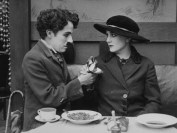 Charlie Chaplin: Short Comedies including The Immigrant (Dir, Charles Chaplin, US, 1917) and One A.M. (Dir. Charles Chaplin, US, 1916) (Screening format – not known, 90mins) In The Immigrant, newly arrived immigrant Chaplin struggles to pay for a meal with his new found lady friend while in One A.M., Charlie Chaplin is the drunken homeowner having a difficult time getting in to his own home after arriving back late at night. Presented by Lucky Dog Picture House. With the world premier of live score by pianist Christopher Eldred and percussionist Nicholas D. Ball of The Lucky Dog Picture House. Wilton’s Music Hall, London Link
Charlie Chaplin: Short Comedies including The Immigrant (Dir, Charles Chaplin, US, 1917) and One A.M. (Dir. Charles Chaplin, US, 1916) (Screening format – not known, 90mins) In The Immigrant, newly arrived immigrant Chaplin struggles to pay for a meal with his new found lady friend while in One A.M., Charlie Chaplin is the drunken homeowner having a difficult time getting in to his own home after arriving back late at night. Presented by Lucky Dog Picture House. With the world premier of live score by pianist Christopher Eldred and percussionist Nicholas D. Ball of The Lucky Dog Picture House. Wilton’s Music Hall, London Link
9 August
 Safety Last (Dir. Fred C Newmeyer/Sam Taylor, US, 1923) (Screening format – not known, 73mins) A boy (Harold Lloyd) moves to New York City to make enough money to support his loving girlfriend (Mildred Davis), but soon discovers that making it in the big city is harder than it looks. When he hears that a store manager will pay $1,000 to anyone who can draw people to his store, he convinces his friend, the “human fly,” (Bill Strother) to climb the building and split the profit with him. But when his pal gets in trouble with the law, he must complete the crazy stunt on his own. The image of Harold Lloyd hanging desperately from the hands of a skyscraper clock during Safety Last! is one of the great icons of film history (although it was achieved with a certain amount of film trickery) and this remains one of the best and best loved comedies of the silent era. Find out more at rogerebert.com. Presented by Lucky Dog Picture House. With the world premier of a new live score by pianist Tom Marlow of The Lucky Dog Picture House. Wilton’s Music Hall, London Link
Safety Last (Dir. Fred C Newmeyer/Sam Taylor, US, 1923) (Screening format – not known, 73mins) A boy (Harold Lloyd) moves to New York City to make enough money to support his loving girlfriend (Mildred Davis), but soon discovers that making it in the big city is harder than it looks. When he hears that a store manager will pay $1,000 to anyone who can draw people to his store, he convinces his friend, the “human fly,” (Bill Strother) to climb the building and split the profit with him. But when his pal gets in trouble with the law, he must complete the crazy stunt on his own. The image of Harold Lloyd hanging desperately from the hands of a skyscraper clock during Safety Last! is one of the great icons of film history (although it was achieved with a certain amount of film trickery) and this remains one of the best and best loved comedies of the silent era. Find out more at rogerebert.com. Presented by Lucky Dog Picture House. With the world premier of a new live score by pianist Tom Marlow of The Lucky Dog Picture House. Wilton’s Music Hall, London Link
10 August
 Sherlock Jnr (Dir. Buster Keaton, 1924) + shorts (Screening format – not known, 90 mins) In Sherlock Jr, a kindly movie projectionist (Buster Keaton) longs to be a detective. When his fiancée (Kathryn McGuire) is robbed by a local thief (Ward Crane), the poor projectionist is framed for the crime. Using his amateur detective skills, the projectionist follows the thief to the train station – only to find himself locked in a train car. Disheartened, he returns to his movie theatre, where he falls asleep and dreams that he is the great Sherlock Holmes. Although not a popular success on its initial release, the film has come to be recognised as a Keaton classic with its special effects and elaborate stunts making it a landmark in motion picture history. Find out more at silentfilm.org. Presented by Lucky Dog Picture House. With world premier of live score from The Lucky Dog Cinema Band. Wilton’s Music Hall, London Link
Sherlock Jnr (Dir. Buster Keaton, 1924) + shorts (Screening format – not known, 90 mins) In Sherlock Jr, a kindly movie projectionist (Buster Keaton) longs to be a detective. When his fiancée (Kathryn McGuire) is robbed by a local thief (Ward Crane), the poor projectionist is framed for the crime. Using his amateur detective skills, the projectionist follows the thief to the train station – only to find himself locked in a train car. Disheartened, he returns to his movie theatre, where he falls asleep and dreams that he is the great Sherlock Holmes. Although not a popular success on its initial release, the film has come to be recognised as a Keaton classic with its special effects and elaborate stunts making it a landmark in motion picture history. Find out more at silentfilm.org. Presented by Lucky Dog Picture House. With world premier of live score from The Lucky Dog Cinema Band. Wilton’s Music Hall, London Link
11 August
 Pandora’s Box (Dir. G W Pabst, Ger, 1929) (Screening format – not known, 135mins) For film details see 5 August above. With recorded soundtrack. Presented as part of the Chichester Festival. Chichester Cinema, Chichester Link
Pandora’s Box (Dir. G W Pabst, Ger, 1929) (Screening format – not known, 135mins) For film details see 5 August above. With recorded soundtrack. Presented as part of the Chichester Festival. Chichester Cinema, Chichester Link
12 August
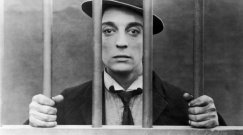 Buster Keaton Triple-Bill Funday. Celebrate the genius of director and star Buster Keaton with a triple bill of brilliant slapstick comedy, introduced by young programmer Keaton Leigh. From an out-of-his depth student attempting to create a fully automated home in The Electric House (1922, 22min), and a man accidentally sent up in a hot air balloon in The Balloonatic (1923, 22min), to a classic case of mistaken identity in Cops (1922, 18min), Keaton’s deadpan charm and timeless invention will have you rolling in the aisles. With live piano accompaniment. BFI Southbank, London Link
Buster Keaton Triple-Bill Funday. Celebrate the genius of director and star Buster Keaton with a triple bill of brilliant slapstick comedy, introduced by young programmer Keaton Leigh. From an out-of-his depth student attempting to create a fully automated home in The Electric House (1922, 22min), and a man accidentally sent up in a hot air balloon in The Balloonatic (1923, 22min), to a classic case of mistaken identity in Cops (1922, 18min), Keaton’s deadpan charm and timeless invention will have you rolling in the aisles. With live piano accompaniment. BFI Southbank, London Link
 L’Age d’or (Dir. Luis Bunuel, Fr, 1930) (Screening format – 35mm, 63mins) More than 80 years on, this masterpiece of cinematic surrealism remains as brilliantly witty and shocking as ever. Uniting the genius of Luis Buñuel and Salvador Dali, L’Age d’Or is a uniquely savage blend of visual poetry and social commentary. A sinister yet poignant chronicle of a couple’s struggle to consummate their desire but repeatedly frustrated in their efforts by the combined forces of the church, the law and bourgeois convention – the film was banned and vilified for many years for its subversive eroticism and furious dissection of ‘civilised’ values. Find out more at sensesofcinema.com. With recorded score. BFI Southbank, London Link
L’Age d’or (Dir. Luis Bunuel, Fr, 1930) (Screening format – 35mm, 63mins) More than 80 years on, this masterpiece of cinematic surrealism remains as brilliantly witty and shocking as ever. Uniting the genius of Luis Buñuel and Salvador Dali, L’Age d’Or is a uniquely savage blend of visual poetry and social commentary. A sinister yet poignant chronicle of a couple’s struggle to consummate their desire but repeatedly frustrated in their efforts by the combined forces of the church, the law and bourgeois convention – the film was banned and vilified for many years for its subversive eroticism and furious dissection of ‘civilised’ values. Find out more at sensesofcinema.com. With recorded score. BFI Southbank, London Link
14 August
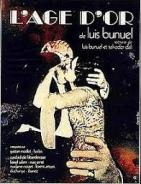 L’Age d’or (Dir. Luis Bunuel, Fr, 1930) (Screening format – 35mm, 63mins) More than 80 years on, this masterpiece of cinematic surrealism remains as brilliantly witty and shocking as ever. Uniting the genius of Luis Buñuel and Salvador Dali, L’Age d’Or is a uniquely savage blend of visual poetry and social commentary. A sinister yet poignant chronicle of a couple’s struggle to consummate their desire but repeatedly frustrated in their efforts by the combined forces of the church, the law and bourgeois convention – the film was banned and vilified for many years for its subversive eroticism and furious dissection of ‘civilised’ values. Find out more at sensesofcinema.com. With recorded score. BFI Southbank, London Link
L’Age d’or (Dir. Luis Bunuel, Fr, 1930) (Screening format – 35mm, 63mins) More than 80 years on, this masterpiece of cinematic surrealism remains as brilliantly witty and shocking as ever. Uniting the genius of Luis Buñuel and Salvador Dali, L’Age d’Or is a uniquely savage blend of visual poetry and social commentary. A sinister yet poignant chronicle of a couple’s struggle to consummate their desire but repeatedly frustrated in their efforts by the combined forces of the church, the law and bourgeois convention – the film was banned and vilified for many years for its subversive eroticism and furious dissection of ‘civilised’ values. Find out more at sensesofcinema.com. With recorded score. BFI Southbank, London Link
24 August
 Vampyr (Dir. Carl Theodore Dreyer, 1932) (Screening format – not known, 75mins) Technically, Dryer’s first sound film but with very little dialogue and extensive use made of inter-titles) Staying at a country inn, Allan Grey scoffs at the notion of supernatural death before being forced to believe that there may be things beyond his understanding. The skills of director and cameraman induce a similar confusion on the part of those watching,
Vampyr (Dir. Carl Theodore Dreyer, 1932) (Screening format – not known, 75mins) Technically, Dryer’s first sound film but with very little dialogue and extensive use made of inter-titles) Staying at a country inn, Allan Grey scoffs at the notion of supernatural death before being forced to believe that there may be things beyond his understanding. The skills of director and cameraman induce a similar confusion on the part of those watching, 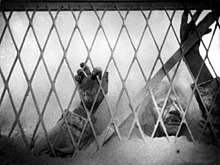 as we encounter one of cinema’s great nightmares. Dreyer offers few explanations for the phenomena on screen: strange and frightening things may just happen. Vampyr opened to a generally negative reception from audiences and critics. Dreyer edited the film after its German premiere and it opened to more mixed opinions at its French debut. The film was long considered a low point in Dreyer’s career, but modern critical reception to the film has become much more favorable with critics praising the film’s disorienting visual effects and atmosphere. Find out more at wikipedia.org Presented as part of the Chichester Festival. With live organ accompaniment by Ben Hall. Chichester Cinema, Chichester Link
as we encounter one of cinema’s great nightmares. Dreyer offers few explanations for the phenomena on screen: strange and frightening things may just happen. Vampyr opened to a generally negative reception from audiences and critics. Dreyer edited the film after its German premiere and it opened to more mixed opinions at its French debut. The film was long considered a low point in Dreyer’s career, but modern critical reception to the film has become much more favorable with critics praising the film’s disorienting visual effects and atmosphere. Find out more at wikipedia.org Presented as part of the Chichester Festival. With live organ accompaniment by Ben Hall. Chichester Cinema, Chichester Link
NB. Whilst every effort has been taken to ensure that the information contained in these listings is accurate, silentfilmcalendar.org can take no responsibility for any errors or inaccuracies. You are strongly advised to confirm with the venue that the event remains as detailed, particularly if traveling any distance to attend.
